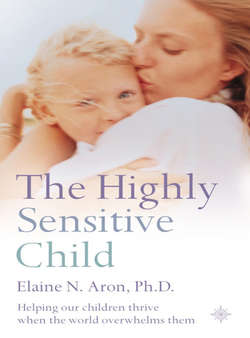Читать книгу The Highly Sensitive Child: Helping our children thrive when the world overwhelms them - Elaine N. Aron, Elaine N. Aron Ph.D. - Страница 15
Inside the Highly Sensitive Child
ОглавлениеLet’s go farther inside the mind of your HSC. Yes, he notices more, but he may have a “specialty.” Some tune in to social cues, mainly noticing moods, expressions, or relationships. Some HSCs mainly notice the natural world, such as changes in the weather or the qualities of plants, or they seem to have an uncanny ability to communicate with animals. Some express subtle concepts, or the humorous and ironic. And some are mainly vigilant in new surroundings while others are mainly bothered by a change in the familiar. Still, in all cases, they are noticing more.
Your HSC is also thinking more than other kids about what she has noticed. Again, there is always variation. She may be pondering and asking you questions about social dilemmas—why you did what you did, why one kid teased another—or larger social issues. Another HSC might be trying to solve difficult math or logic puzzles, or worrying about “what would happen if,” or making up stories or imagining their cat’s thoughts. All kids do these things, but HSCs do them more.
The HSCs’ reflecting on “what’s come in,” particularly whatever they have seen or heard, may be quite conscious and obvious, as when they ask for more time to decide something. (You have probably noticed that trying to get an HSC to decide quickly is like trying to walk a male dog quickly past fire hydrants.) But often HSCs’ processing is entirely unconscious, as when they just intuitively sense what is going on with you. Indeed, intuition might be defined as knowing something without knowing how you know it, and sensitive people are generally highly intuitive.
The processing may be rapid, as when a child instantly knows “something’s up” or “you changed my sheets” when other children would not notice. Or it may be slow, as when HSCs think about something for hours, then announce some startling insight.
Finally, as a result of taking in more and processing it more completely, if the situation is creating an emotional response (and all situations do to some extent), your HSC is going to feel stronger emotions. Sometimes it’s intense love, awe, or joy. But because all children are dealing with new, stressful situations every day, HSCs will also have to feel fear, anger, and sadness, and feel these more intensely than other children.
Because of these strong feelings and deep thoughts, most HSCs are unusually empathic. So they suffer more when others suffer and become interested early in social justice. They are also brilliant interpreters of what is happening in anything or anyone that cannot speak—plants, animals, organs in bodies, babies, those not speaking the sensitive person’s language, and the very elderly when they suffer from dementia. They tend to have rich inner lives. And again, HSCs are conscientious for their age—they can imagine for themselves or understand when you say “what if everybody did that.” They also tend to seek the meaning of their lives very early.
Mind you, HSCs are not saints. In particular, with a few bad experiences, they are more likely than others to become shy, fearful, or depressed. But with a little gentle guidance, they are exceptionally creative, cooperative, and kind—except when overwhelmed. And whatever they are doing—or not doing—HSCs do stand out, even though they are not “problems” in the usual sense.
Long before I knew I was raising a highly sensitive child, I just knew my son was “different.” He was aware, incredibly creative, conscientious, cautious in new situations, easily hurt by his peers, not fond of “rough and tumble” play or sports, and emotionally intense. He was hard to raise in some ways, easy in others, and always stood out, even if only as the kid who was not joining in. So I developed the motto that I shared with you in the Introduction: If you want to have an exceptional child, you must be willing to have an exceptional child.
